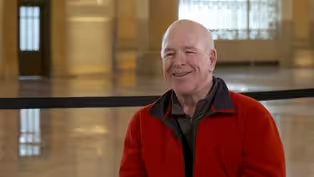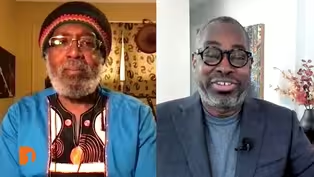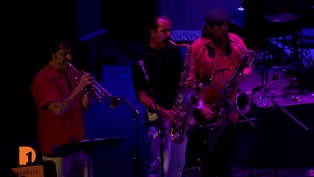
Royal Starr Film Festival highlights Michigan films, including “1969: Killers, Freaks and Radicals”
Clip: Season 10 Episode 11 | 8m 34sVideo has Closed Captions
The Royal Starr Film Festival showcases films from Michigan and around the world.
The Royal Starr Film Festival is back in Metro Detroit for its tenth year, showcasing films from Michigan and around the world. The festival runs through Sunday, Sept. 14 at Emagine’s Birmingham 8 Theater. One Detroit got the details on this year’s event from one of the organizers. Plus, local filmmaker Andrew Templeton talks about his documentary “1969: Killers, Freaks, and Radicals.”
Problems playing video? | Closed Captioning Feedback
Problems playing video? | Closed Captioning Feedback
One Detroit is a local public television program presented by Detroit PBS

Royal Starr Film Festival highlights Michigan films, including “1969: Killers, Freaks and Radicals”
Clip: Season 10 Episode 11 | 8m 34sVideo has Closed Captions
The Royal Starr Film Festival is back in Metro Detroit for its tenth year, showcasing films from Michigan and around the world. The festival runs through Sunday, Sept. 14 at Emagine’s Birmingham 8 Theater. One Detroit got the details on this year’s event from one of the organizers. Plus, local filmmaker Andrew Templeton talks about his documentary “1969: Killers, Freaks, and Radicals.”
Problems playing video? | Closed Captioning Feedback
How to Watch One Detroit
One Detroit is available to stream on pbs.org and the free PBS App, available on iPhone, Apple TV, Android TV, Android smartphones, Amazon Fire TV, Amazon Fire Tablet, Roku, Samsung Smart TV, and Vizio.
Providing Support for PBS.org
Learn Moreabout PBS online sponsorship(upbeat electronic music) - We are here at the Birmingham 8, home to the 10th annual Royal Starr Film Festival, Billy, tell me a bit about the festival.
- Coming up September 11th through 14th, we have 100 films that are gonna be showcased over that Thursday, Friday, Saturday and Sunday for people to come out and see, they're a mixture of both documentary as well as narrative features and shorts from around Michigan, around the nation, around the world.
We started at the Royal Oak Emagine for our first seven years, and we've been here at the Birmingham 8 Powered by Emagine for the past three.
- And now, the festival is just part of the work that Royal Starr does, I mean, you do a lot to build community among local filmmakers, you have the filmmaker mixers that happen from time to time, tell me a bit about that.
- Yeah, so the parent nonprofit is the Royal Starr Arts Institute, which the Royal Starr Film Festival is part of that, we also do filmmaker community mixers every month, the second Tuesday of every month at the Eastern Palace Club in Hazel Park, and that's an opportunity for various filmmakers of Michigan to get together, to collaborate, to actually see each other in person, to see what projects they're working on and see what they can create next.
- Why is that so important, to create that community among filmmakers here?
- Well, filmmaking is really a collaborative endeavor and it takes a lot of people to build that team out.
A lot of us are still developing our skills, and learning and building our networks, but the way we have technology nowadays and the distribution channels, filmmakers can be anywhere in the world that actually create content and monetize that content, and we're looking to empower the Michigan filmmakers to do that.
- And how many films get submitted for this festival every year?
- There are hundreds, hundreds, hundreds, and our... We have this very dedicated film selection committee that goes through, watches them, there's a various grading system, and that helps us go through the large submissions that we have.
You can find all the films, their write-ups, the trailers at boxoffice.royalstarr.org, you can kinda peruse the 100 different films and see what's interesting, we have one film called "Breasts Not Required," that's the story of nine women who had undergone mastectomies and their stories about undergoing that, we have another very intriguing film, it's called "1969," which is a local film out of Ann Arbor, and that's, like, a true crime, history story.
One's called "Power Lines," and that was a organization that got together and they were going forward with trying to create political districts in Michigan that actually made sense and they weren't biased, and so, this is their documentary about their endeavor going through that.
There is one non-competition film that we're gonna be screening that I'm actually acting in, it's called "On Gallows Hill," it's kind of an '80s vampire cult-classic movie, it's gonna be having its premiere here at the Emagine Saturday night at 6:00 PM, and again, all those tickets are available as well as the trailers and the write-ups at boxoffice.royalstarr.org.
- So people who come to the festival, what do you hope that they see or that they learn about our Michigan community of filmmakers here?
- Just that there's so much talent out there, I mean, everyone has a story to tell, and to see these stories on the screen, there are so many different topics and so many different takes on things, and we're also part of that community, so we do like to emphasize our Michigan filmmakers because those are the ones that are creating the films of tomorrow.
- [Person] We had the Michigan murders, the campus riots, Vietnam War protestors... - [Chris] One of the Michigan films featured in the festival is "1969: Killers, Freaks, and Radicals," a documentary directed by Andrew Templeton.
Earlier this year, the documentary won the Audience Award at the Cinetopia Film Festival in Ann Arbor.
It is one of the headlining films on Friday night.
- Making sure when we go out, we go in groups and don't go by yourself any place.
- [Person] There was a big conflict with the older generation, they said, "We're looking among the freaks, and radicals, and hippie element for the killer."
- It's a film about the late '60s in the Ann Arbor area, it was a fascinating time historically, a lot of, you know, unique cultural things going on, you've got the women's movement, the civil rights movement, war in Vietnam, and all of this is going on at the same time as this series of really shocking murders of young women, and I had read about the crime, you know, I guess about seven years ago now when I was living in Ann Arbor, and I was just fascinated that I hadn't heard about it and it felt like there was still a lot left unresolved.
- You did a lot of really unique research for the film, a lot of FOIA requests, a lot of interviews with people who were there, who knew the victims, who were investigating, who were part of the whole counterculture community in Ann Arbor and Ypsi then, tell me a bit about that process of the research that you did and kinda how you told the story in a unique way.
- When I started, I definitely wanted to take a sort of... Like, a fresh, independent look at it, 'cause I just felt like things were, like I said, unresolved, I mean, John Collins was convicted of one murder, but the rest are all officially unsolved, when I started to talk to people from that time or who had a relationship with the case, it did seem to come up that there was a sense of frustration at the lack of resolution, and that it maybe could have been made a bit clearer or some more convictions could have occurred, and then, once I was on that path, I got into research, I requested documents from the state police, which was a whole thing I'd never done before, there was a lot of stuff in the files that I got that wasn't... That had never been public information, and it was surprising and it told a lot, I think, about the investigation that is maybe poorly understood, even from people who lived through it and have some familiarity with the cases.
- Something the film does really well is you really give that sense of the cultural context of the backdrop that this story played out against, how did you approach this sort of daunting task of telling this, like, huge story that's, like, about the murders, but also, about this whole era, and includes voices like John Sinclair and everything that you brought into it?
- The more research I did, the more I felt like that couldn't... You couldn't separate that part of the story from the crimes and the investigation themselves because it's kind of intertwined and, you know, societal norms affect everything, a good example would be the... You know, I think the police in general in some parts of society were very focused on this outsider element, hippies, freaks, radicals, and that's something I saw again and again in newspaper reports, police reports, those terms, and it's hard to not see how that doesn't play into the failures of the investigation as well, and it's also, I think, a reflection of how people's lives were, like, the women interviewed in the film, I kinda wanted to get a little bit of their... What it was like to be a young woman at the time, and I thought exploring all of that other stuff that was going on was important to give a full picture and not just focus solely on the murder investigation.
- The film is gonna be in the Royal Starr Film Festival here, had you been familiar with that festival before you submitted for this film?
- Yeah, you know, I've been to their filmmaker mixers that they do, which are a great thing, anybody... You know, Detroit or Michigan filmmaker should come to these things, they're very friendly and it's a great way to meet crew and just even just talk about the process of being an independent filmmaker, a local filmmaker.
- Why do you think that's so important?
- Well, I think that's important just, you know, to foster that community anywhere, independent film is tough and you have to support other creators, and I think there's just a lot of interesting Michigan stories to be told, both fiction and nonfiction, so the more independent filmmakers come together and collaborate, the more things we can share with the world.
Bill Goodwin shares how his parents came to Detroit to find work in the automotive industry
Video has Closed Captions
Clip: S10 Ep11 | 1m 47s | Bill Goodwin of Shelby Township participates in One Detroit’s “Destination Detroit” series. (1m 47s)
September is Black Reading Month encourages people to turn off the TV, read Black authors
Video has Closed Captions
Clip: S10 Ep11 | 7m 53s | September is Black Reading Month encourages people to read books by Black authors. (7m 53s)
Spanglish Fly brings Latin boogaloo to this year’s Concert of Colors
Video has Closed Captions
Clip: S10 Ep11 | 4m 20s | Detroit PBS’ “Best of Concert of Colors” features boogaloo band Spanglish Fly. (4m 20s)
Providing Support for PBS.org
Learn Moreabout PBS online sponsorship
- News and Public Affairs

Top journalists deliver compelling original analysis of the hour's headlines.

- News and Public Affairs

FRONTLINE is investigative journalism that questions, explains and changes our world.












Support for PBS provided by:
One Detroit is a local public television program presented by Detroit PBS


